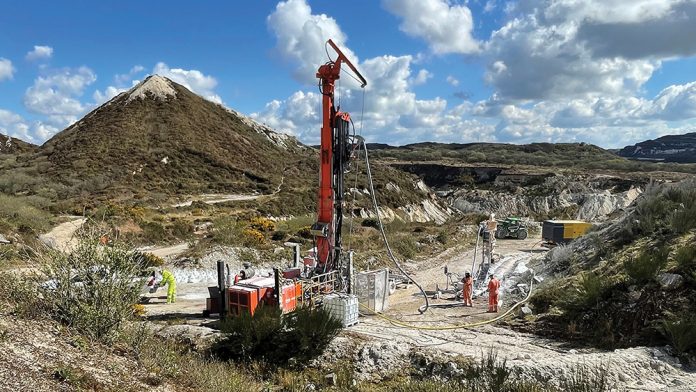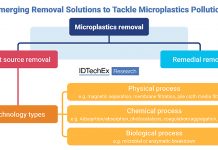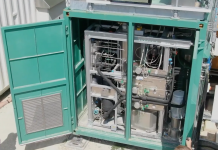According to the International Energy Agency (IEA), the world could face lithium shortages by 2025. Rockwell Automation is working with Cornish Lithium Plc on a demonstration plant to validate the sustainable production of lithium hydroxide from micaceous granite. By Alwyn de Vries, Lifecycle Services Business Development Leader, Rockwell Automation.
How serious could the lithium shortage be?
The lithium market is being heavily driven by the battery industry, electric car industry, and the battery storage industry, all of which are currently driving high demand for lithium salts which is by far exceeding current and planned supply. Investors in Europe are still very tentative to invest too heavily in the extraction and refining of lithium, hence the demand for most companies to have a pilot or demonstration plant proving that their technology is viable. Lithium can be found in quite a few places globally, but the issue is finding it in a high enough concentration to make it economically viable to extract and process.
Environmental permitting and historical mining issues have hampered the granting of new extraction and refining licenses in Europe, which has in turn added more strain on the supply chain of lithium salts. The shortage in supply has driven up the spot price for lithium salts over the last couple of years.
There are mainly two sources of lithium in the world: spodumene, which is a mineral that’s found mainly in Australia, where it is extracted and then exported to China for conversion into lithium salts. In South America, they extract lithium from underground water. Lithium is very soluble and when you have deep, underground geothermal waters, the lithium dissolves quite readily. And so, in South America, they are pumping the brine to the surface, and then letting the moisture evaporate in large ponds.
When did you start working with Cornish Lithium?
Rockwell Automation first made contact with Cornish Lithium in December 2020, introducing our capabilities and references in the lithium industry from the main regions where we have been involved with projects, like Australia, China and South America. We could clearly demonstrate the value that Rockwell Automation could bring to a start-up like Cornish Lithium and the fact that our systems are scalable, whatever the size of the project.
Is it the first time Rockwell has been involved in a project of this nature?
No, Rockwell Automation has a long and proud history of collaborating and delivering Automation projects in the Mining industry but also more directly for Lithium.
Can you tell us a bit about the process under license by Cornish Lithium?
Cornish Lithium have licensed an acid-leaching, selective precipitation and crystallisation process developed to create lithium hydroxide from micaceous granite. This process differs from the traditional hard rock process, which traditionally involves a significant calcination step where the rock is cooked at 1,000°C, which is not an environmentally friendly process.
The validity of the process has already been tested at a small pilot plant in Australia and proven that it can produce lithium hydroxide. The next step is constructing a demonstration plant at the site in Cornwall. This will be a complete, conceptual end-to-end process from the raw material to lithium hydroxide, using all the same equipment employed in a full-scale facility with just one or two changes for scale reasons. This simulation of the actual process will assure shareholders investing in a full-scale production facility.
Cornish Lithium have a licensed process called the lipidome process. It is an acid leaching, selective precipitation and crystallisation process. It was developed to create lithium hydroxide from micaceous granite; we are looking at the mica part of the granite, the fine mineral in the granite. This process is expected to be more environmentally friendly than the traditional hard rock process, which usually involves a significant calcination step, where the ore is calcined at 1,000°C. This process is purely a chemical process where we avoid that high temperature process.
Cornish Lithium have run the Cornish materials through their small pilot plant in Australia and proved that it can make lithium hydroxide from our material, through the process. This is on a large lab scale; an end-to-end demonstration of the technology.
Cornish Lithium have an old Imerys China Clay mine, owned by a private landowner, which they are converting into a demonstration facility. Two plants are being built: one is a mineral concentration plant which will take the raw ore, crush it, mill it, carry out mineral separation and flotation to create what it calls a mica concentrate. Lithium rich mica, which is taken from 0.01 per cent to one per cent lithium in the ore, yielding a very fine sandy material, which is rich in lithium.
Then the real mineral processing side to the chemical plant – a hydrometeorology acid leaching system or the Lepidico process – dissolves that mineral, extracts all the metals, including lithium, iron, aluminum and potassium. It leaves the silica undissolved, and then the salts are converted. All the unwanted properties in the salts are removed to leave lithium sulphate, and this is converted into lithium hydroxide, which is a battery precursor.
It is a series of reactors, where materials are added to promote precipitation of the elements that are not required. Limestone is added to create gypsum and remove calcium and other materials; lime is added to remove iron by changing the oxidation state of iron. Chemical reactors carry out the acid dissolving filtration steps and remove the precipitate in solids from the liquids by using membrane filter presses. Then crystallisation; some of the salts will precipitate – they will come out of the solution because they are not soluble. And once you change them into something else, then you have elements that are soluble that you need to crystallise. So, you evaporate the liquid and as the liquid volume goes down, and with the amount of solids in there, there is not enough liquid to have it in solution, so it then starts to crystallise itself. Industrial crystallisers will force that crystallization to make the final salts products. It is really a combination of chemical reactors, precipitators, filtration, and crystallization.
How will the validation process work?
Rockwell Automation will play quite a key role in Cornish Lithium’s trials. Cornish Lithium want to simulate as much of the industrial process control that they might employ at full scale. They are trying to put as much of that into the demonstration plant as possible, as this is a complex multi-stage process with lots of recycles. Lots of sequential operations, particularly with filtration, the process control of which is very critical. There are crucial balancing steps with different additives and chemicals, along with numerous wash steps with filtration. Rockwell Automation is putting together the process control philosophy, based on the instrumentation of the plant and the licensed process from Lepidico. It is not a simple ‘push start, and everything will run’ operation, it is a series of different process control units that need to be coordinated to have a plant that will operate as if it was a full-scale plant.
What’s the next stage if trials are successful?
Cornish Lithium are constructing an end-to-end mini simulation of the real plant. The next step will be to build a full-scale facility. But at the moment, they have decided to build a full conceptual end-to-end process from the raw material to lithium hydroxide, using the same equipment that you would expect to see in a full-scale plant with just one or two compromises for scale reasons, but with all the same type of process unit steps, and a similar process control philosophy. It is a simulation of the real process for the shareholders and investors to have confidence in the big investment that we want to make in a couple of years’ time.
Specific challenges?
Making sure that the demonstration plant comes online on plan and is operating to its fullest potential. This will assist in creating better investor confidence to secure the funding needed to bring a full-scale plant to fruition.
Environmental permitting and government support for the extraction and processing of lithium chemicals.
Lessons learned?
The project is still in its early stages but understanding the finer controls needed to keep the plant in balance to be able to deliver the correct quality of Lithium Hydroxide will be imperative.









